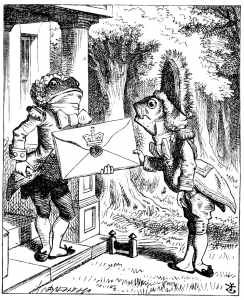A Whackadoodle answer in which my student and I answer a Dear Navigator question about sarcasm; only to end up discussing why classifications matter.
“So we have another one,” she told me, waiving her iPhone.
“Another Dear Navigator question?” I asked, pleasantly surprised.
“Sort of,” she nodded. “It was a question posted as a comment on that article we posted last week about the difference between irony and satire.”
“Oh yeah,” I nodded. “So what’s this new question?”
“He sent us a link to an article by a woman named Michelle Teheux. She writes for Medium like you do.”
“Like I sometimes do,” I corrected. “Mostly I tutor you.”
“Anyway,” she said, dismissing my comment. “He wants to know if her post is an example of sarcasm.”
“So where is the post?” I asked, reaching out for her iPhone.
She plug a request into her phone, waited a moment, then handed me the phone saying, “Here.”
The article was entitled The New Religion: Trumpianity. I read her article through, chuckled a bit, and said without looking up. “This is defiantly not sarcasm. This is more satire. She is claiming to have joined a new religion in which Trump’s tweets are the scripture. Then she points us to a link,” I added, clicking on the link, “which bring us to a site that logs every one of Trump’s Tweets until he got kicked off the platform on January 8. Jeez,” I laughed. “This is defiantly satire.”
“That’s what I thought,” she nodded. “It’s satire because she is taking a position, and then attempting to show how ridiculous that position is, right?”
“You have had excellent tutelage,” I teased, handing back her phone.
“So then what is sarcasm?” she asked, ignoring my praise.
“It’s when you say something you don’t mean, and everybody knows it, in an attempt to get a reaction—hopefully a smile.”
“Like when you tell me how much I love math, even though you know I hate it?”
“Yeah,” I agreed. “Or when you come into work twenty minutes late, soaking wet, because there was a rain storm, and despite your umbrella, every car driving through the huge puddle next to your bus stop drowned you in a shower; then a co-worker greets you with, ‘Looks like you’ve had a good morning.”
“Got it,” she said, then added. “Did that really happen?”
“What do you think?”
“I think that what I think doesn’t matter,” she quipped back. “And I believe that I might have given you a sarcastic response,” she added a bit later with a smile.
“I think that you might be right,” I agreed, smiling back.
“So let me make sure I understand,” she continued eventually. “Irony is when you simply point out something ironic. Like the fact that Trump is being investigated for the very crime that he wants Hilary locked up for—mishandling of federal documents.”
“Defiantly ironic.” I confirmed.
“But satire is when you take a position, argue for it, and attempt to show how ridiculous the argument is.”
“Right again,” I confirmed again.
“So that makes sarcasm more like a one-liner that people use to hopefully crack a smile.”
“Correct,” I nodded. “You will seldom see sarcasm as the basis of an essay, but you will often find sarcasm used in a dialogue.”
“So what would you call this,” she asked shyly, placing a notepad in front of me. “Is it sarcasm, irony, or satire?”
I looked down to find the notepad open to what appeared to be a short hand written poem entitled:
The Magic Fairy
No need to toss your trash
Just leave it in the counter
The magic fairy will clean it up for you.
Too tired to pick up your clothes
Just leave them on the floor
The magic fairy will wash them away.
No need to rinse that dish
Just leave the leftovers to dry
The magic fairy will scrub them clean.
Cook breakfast and leave everything out
egg shells, drippings, and all
The magic fairy will soon be up.
“I’d call this a cry for help,” I laughed eventually. “I’m guessing that your new housemates are not used to living without their Magic Fairies.”
“You got that right,” she admitted ruefully. “But what is it? Irony, satire, or sarcasm?”
“Well,” I replied after considering a while. “You seem to be taking on the opinion of a roommate who believes in a Magic Fairy, so that would be satire. However,” I continued. “The very fact that you keep referring to a Magic Fairy makes the magic fairy reference itself sarcastic. Moreover, it does seem a bit ironic that you have chosen to write a poem rather than confront your housemate problems.”
“So you are saying it’s all three?” she sounded disgusted.
“Yes I am,” I admitted. “But I am also wondering why the label matters to you. Some things defy labels, but that does not make them wrong.”
She wrapped her hands around her head and replied, “I guess that I am just trying to understand.”
“So understand this,” I told her. “Writing does not always fall into a category. Life itself defies categorization.”
“So why do we even have categorize?” she asked through her hands.
I took back her phone, and did a search of my own, “Well, according to this Psychology Today article I’m reading, ‘Our brains are constantly seeking ways to manage information overload both through limiting the amount of stimuli we are willing to notice and through creating categories into which to fit things.’”
She groaned, so I clicked a bit more, and added. “Wikipedia suggest that we need to categorize because ‘categorization is important in learning, prediction, inference, decision making, language, and many forms of organisms’ interaction with their environments.’” I shook my head at that, adding, “What ever the heck, ‘many forms of organisms ‘interactions’ means.”
“But what do you think?” she asked, lifting her head.
“I think that we use categorize because that is how we have been taught to think,” I told her bluntly. “Everything is either black or white, but nothing allowed to be grey.”
“Huh?”
“Good versus evil, friend versus enemy, conservative versus liberal, and nothing in between. How is it possible that you can both love someone, and hate someone at the same time, and yet people feel that emotional conflict all the time?” I offered. “Heck, even in kindergarten, we start teaching kids how to sort. One, two, three. Blue, yellow, red. Animal, vegetable, mineral. Mammal, reptile, amphibian, bird, insect, or fish,” I sighed before continuing. “But then every so often, we get hit with a platypus, and we get asked the question, ‘Why?’ Why is an animal who lays eggs also classified as a mammal.”
“And the answer?” she asked.
“Because she has fur, and suckles her children, and doesn’t fit any other classification. She is not a fish, or a bird, or an amphibian, or a reptile, or an insect; so she must be a mammal.”
“So if it doesn’t fit a category, we make it fit a category?”
“I’m afraid we often do,” I replied.
“So you are telling me that classifications don’t matter,” she declared.
“No I am not,” I corrected. “Classifications do help us in learning, prediction, inference, decision making, and language. We also need classifications to keep ourselves from information overload, but we should not be limited by them. We should not feel the need to force anything into a classifications if it doesn’t belong there.”
“What exactly is information overload?” she asked tentatively.
“Well,” I paused to consider my answer. “Think about a world in which nothing is classified, and everything is unique. Everything is one of a kind. What would you do with all that information? How would you handle it? Classifications help us to manage all that uniqueness.”
“Uniqueness,” she repeated.
“Everything in the world is unique,” I told her. “In fact there is a meditative technique were one is asked to just sit in stillness and notice how unique everything is–every leaf, every breeze, every cloud. It is one of my favorite pastimes; but if that was the only thing I ever did, I would not do much else. At some point, I have to make a choice.”
“And you have to classify things in order to make a choice between them?”
“Exactly.” I confirmed. “Because that beautiful and unique cloud overhead, could also be classified as a storm cloud, in which case I might want to get prepared.”
“I think that I understand,” she admitted quietly. “Classifications are important in daily life, but they are only a tool, like cause and effect. We should not feel the need to place everything in one.”
“I like it,” I smiled.
“So is that what people mean when they say, ‘The exception proves the rule?‘” she asked with a half smile back. “Because I have never really understood that saying.”
“Oh my dear, sayings that people use but don’t understand is a whole other category,” I conceded. “You might have to ask the people who use them to explain what they mean themselves. Although, I have to admit that I have often seen people use sayings just to end an argument.”
“Really?”
“Yeah, I once had this boyfriends whose final word in any disagreement was, ‘That’s what makes a horse race.‘ It was very annoying.”
“Huh?”
“It’s from a Mark Twain quote. It basically means that if we didn’t all have different opinions, we’d all bet on the same horse, which would not make for a profitable horse race.”
“So basically he was saying, ‘We should agree to disagree,’” she informed me.
“Pretty much. But then again,” I teased. “There’s an exception to every rule.”
________
If you you enjoyed this post, please leave a comment below. It helps our algorithm.
It would also be great if you shared this post. It also helps our algorithm.
If you would like to join Lynn’s mailing list, or ask a Dear Navigator question click here

You can reach Lynn Marie Sager at
DearNavigator@gmail.com
Author:
- Navigating Life in a Whackadoodle World
- Finding Sense in a Whackadoodle World
- Teaching Logic in a Whackadoodle World
- Navigating Life Through Turbulent Tides
- A River Worth Riding: Fourteen Rules for Navigating Life

